Global Business Environment Report: Analysis of Sasol Limited
VerifiedAdded on 2021/02/20
|18
|5329
|218
Report
AI Summary
This report provides a comprehensive analysis of the global business environment, examining key factors such as market dynamics, environmental considerations, and cost implications that drive global trade and commerce. It delves into the strategic challenges faced by companies like Sasol Limited, including tariffs, international trade laws, and currency exchange rates, while critically analyzing risks and diversification strategies within the supply chain. The report further explores the impact of globalization on organizational culture, structure, and functions, along with ethical and sustainable factors influencing decision-making processes. It investigates different decision-making approaches and various routes to internalization, culminating in a critical evaluation of the global business environment and its implications for companies like Sasol. The report also includes a PESTLE analysis of Sasol, assesses the impact of digital technology, and evaluates strategic expansion routes.
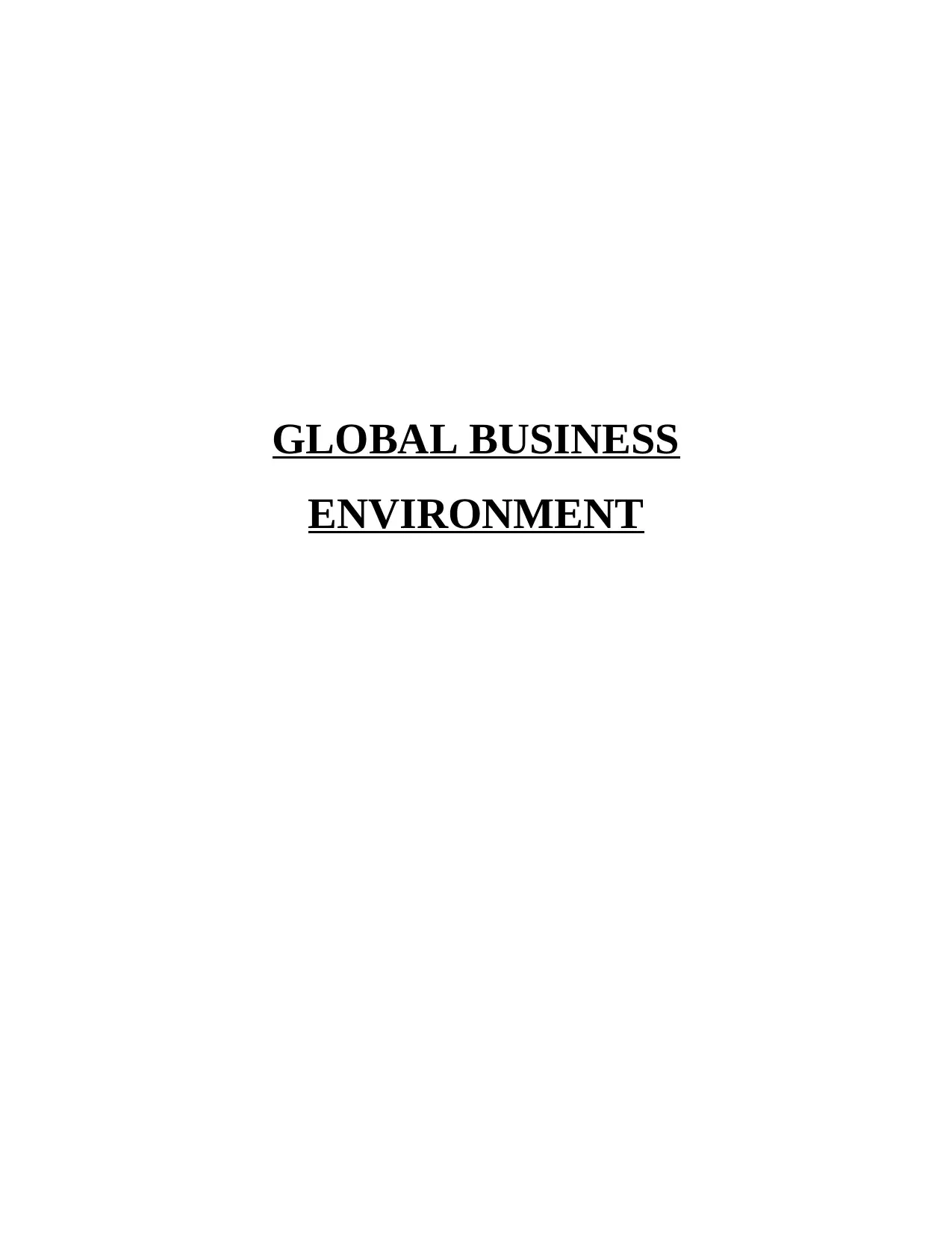
GLOBAL BUSINESS
ENVIRONMENT
ENVIRONMENT
Paraphrase This Document
Need a fresh take? Get an instant paraphrase of this document with our AI Paraphraser
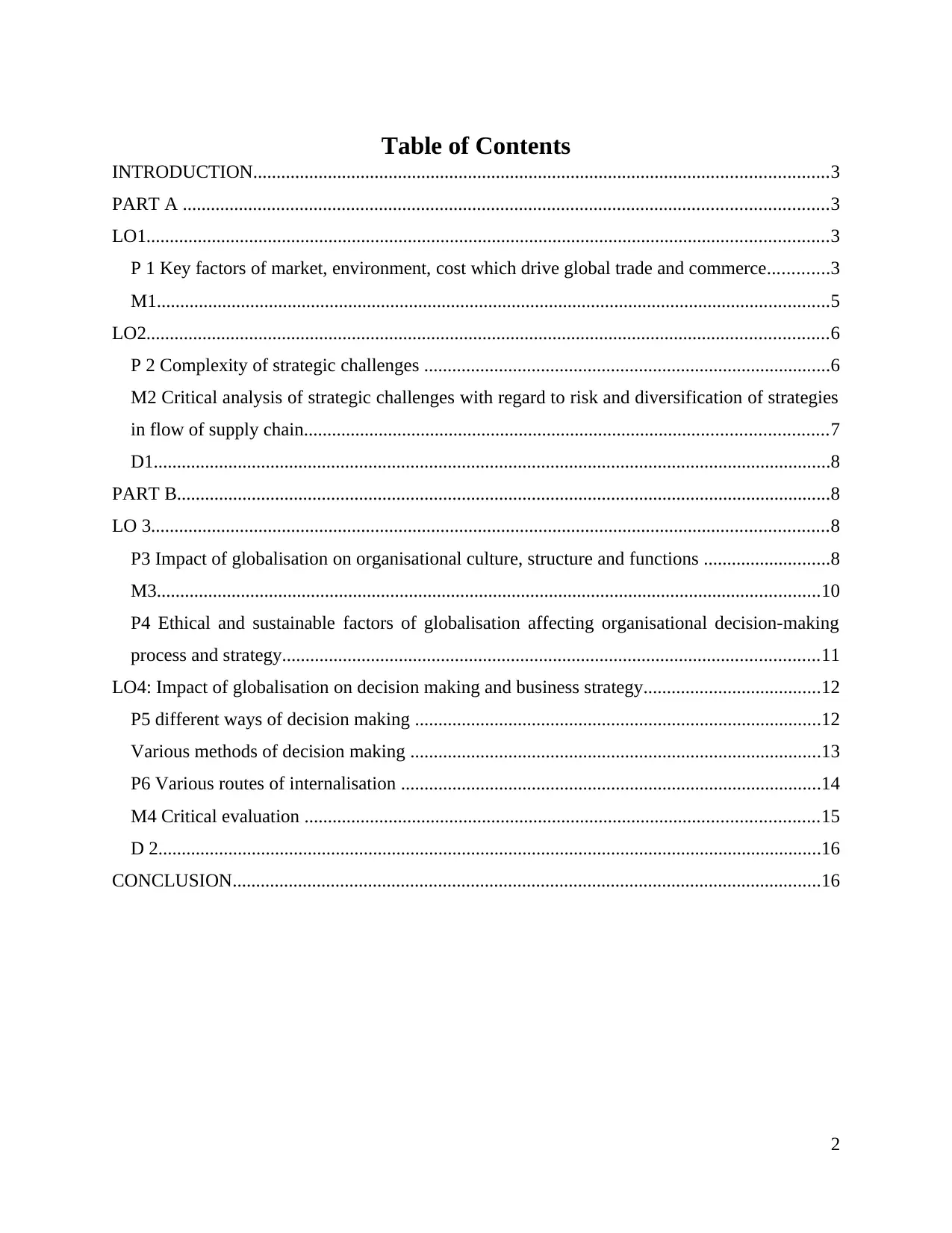
Table of Contents
INTRODUCTION...........................................................................................................................3
PART A ..........................................................................................................................................3
LO1..................................................................................................................................................3
P 1 Key factors of market, environment, cost which drive global trade and commerce.............3
M1................................................................................................................................................5
LO2..................................................................................................................................................6
P 2 Complexity of strategic challenges .......................................................................................6
M2 Critical analysis of strategic challenges with regard to risk and diversification of strategies
in flow of supply chain................................................................................................................7
D1.................................................................................................................................................8
PART B............................................................................................................................................8
LO 3.................................................................................................................................................8
P3 Impact of globalisation on organisational culture, structure and functions ...........................8
M3..............................................................................................................................................10
P4 Ethical and sustainable factors of globalisation affecting organisational decision-making
process and strategy...................................................................................................................11
LO4: Impact of globalisation on decision making and business strategy......................................12
P5 different ways of decision making .......................................................................................12
Various methods of decision making ........................................................................................13
P6 Various routes of internalisation ..........................................................................................14
M4 Critical evaluation ..............................................................................................................15
D 2..............................................................................................................................................16
CONCLUSION..............................................................................................................................16
2
INTRODUCTION...........................................................................................................................3
PART A ..........................................................................................................................................3
LO1..................................................................................................................................................3
P 1 Key factors of market, environment, cost which drive global trade and commerce.............3
M1................................................................................................................................................5
LO2..................................................................................................................................................6
P 2 Complexity of strategic challenges .......................................................................................6
M2 Critical analysis of strategic challenges with regard to risk and diversification of strategies
in flow of supply chain................................................................................................................7
D1.................................................................................................................................................8
PART B............................................................................................................................................8
LO 3.................................................................................................................................................8
P3 Impact of globalisation on organisational culture, structure and functions ...........................8
M3..............................................................................................................................................10
P4 Ethical and sustainable factors of globalisation affecting organisational decision-making
process and strategy...................................................................................................................11
LO4: Impact of globalisation on decision making and business strategy......................................12
P5 different ways of decision making .......................................................................................12
Various methods of decision making ........................................................................................13
P6 Various routes of internalisation ..........................................................................................14
M4 Critical evaluation ..............................................................................................................15
D 2..............................................................................................................................................16
CONCLUSION..............................................................................................................................16
2
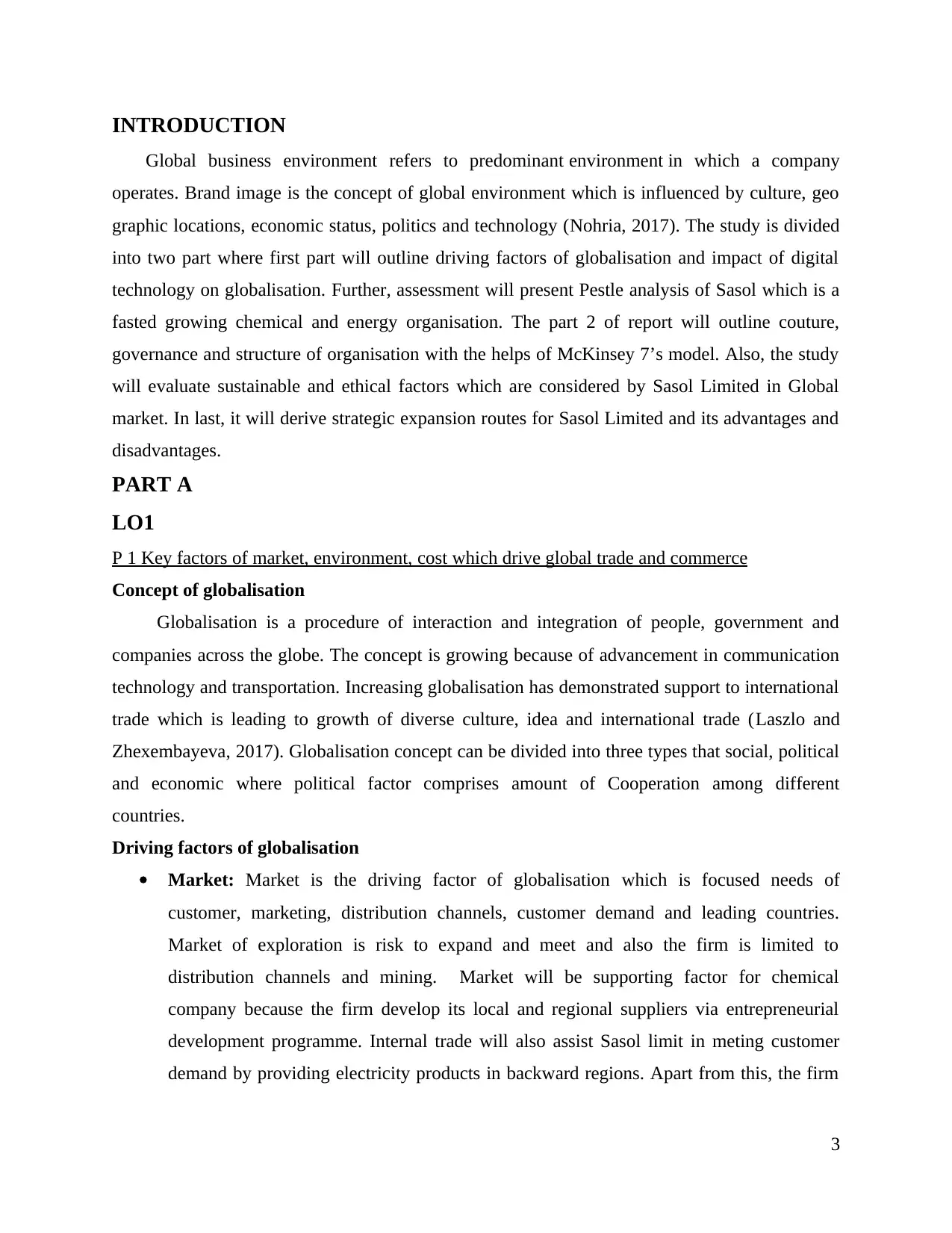
INTRODUCTION
Global business environment refers to predominant environment in which a company
operates. Brand image is the concept of global environment which is influenced by culture, geo
graphic locations, economic status, politics and technology (Nohria, 2017). The study is divided
into two part where first part will outline driving factors of globalisation and impact of digital
technology on globalisation. Further, assessment will present Pestle analysis of Sasol which is a
fasted growing chemical and energy organisation. The part 2 of report will outline couture,
governance and structure of organisation with the helps of McKinsey 7’s model. Also, the study
will evaluate sustainable and ethical factors which are considered by Sasol Limited in Global
market. In last, it will derive strategic expansion routes for Sasol Limited and its advantages and
disadvantages.
PART A
LO1
P 1 Key factors of market, environment, cost which drive global trade and commerce
Concept of globalisation
Globalisation is a procedure of interaction and integration of people, government and
companies across the globe. The concept is growing because of advancement in communication
technology and transportation. Increasing globalisation has demonstrated support to international
trade which is leading to growth of diverse culture, idea and international trade (Laszlo and
Zhexembayeva, 2017). Globalisation concept can be divided into three types that social, political
and economic where political factor comprises amount of Cooperation among different
countries.
Driving factors of globalisation
Market: Market is the driving factor of globalisation which is focused needs of
customer, marketing, distribution channels, customer demand and leading countries.
Market of exploration is risk to expand and meet and also the firm is limited to
distribution channels and mining. Market will be supporting factor for chemical
company because the firm develop its local and regional suppliers via entrepreneurial
development programme. Internal trade will also assist Sasol limit in meting customer
demand by providing electricity products in backward regions. Apart from this, the firm
3
Global business environment refers to predominant environment in which a company
operates. Brand image is the concept of global environment which is influenced by culture, geo
graphic locations, economic status, politics and technology (Nohria, 2017). The study is divided
into two part where first part will outline driving factors of globalisation and impact of digital
technology on globalisation. Further, assessment will present Pestle analysis of Sasol which is a
fasted growing chemical and energy organisation. The part 2 of report will outline couture,
governance and structure of organisation with the helps of McKinsey 7’s model. Also, the study
will evaluate sustainable and ethical factors which are considered by Sasol Limited in Global
market. In last, it will derive strategic expansion routes for Sasol Limited and its advantages and
disadvantages.
PART A
LO1
P 1 Key factors of market, environment, cost which drive global trade and commerce
Concept of globalisation
Globalisation is a procedure of interaction and integration of people, government and
companies across the globe. The concept is growing because of advancement in communication
technology and transportation. Increasing globalisation has demonstrated support to international
trade which is leading to growth of diverse culture, idea and international trade (Laszlo and
Zhexembayeva, 2017). Globalisation concept can be divided into three types that social, political
and economic where political factor comprises amount of Cooperation among different
countries.
Driving factors of globalisation
Market: Market is the driving factor of globalisation which is focused needs of
customer, marketing, distribution channels, customer demand and leading countries.
Market of exploration is risk to expand and meet and also the firm is limited to
distribution channels and mining. Market will be supporting factor for chemical
company because the firm develop its local and regional suppliers via entrepreneurial
development programme. Internal trade will also assist Sasol limit in meting customer
demand by providing electricity products in backward regions. Apart from this, the firm
3
⊘ This is a preview!⊘
Do you want full access?
Subscribe today to unlock all pages.

Trusted by 1+ million students worldwide
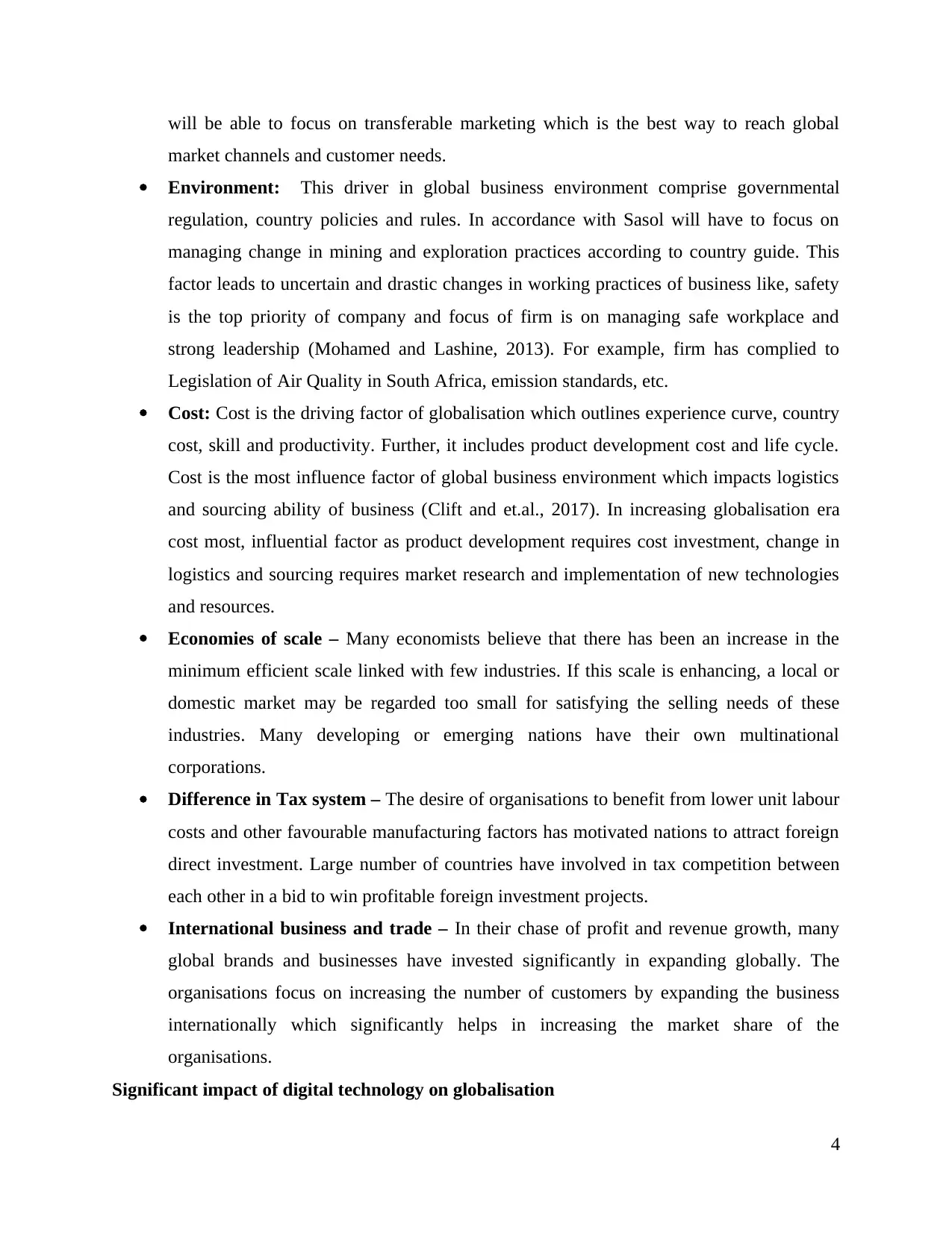
will be able to focus on transferable marketing which is the best way to reach global
market channels and customer needs.
Environment: This driver in global business environment comprise governmental
regulation, country policies and rules. In accordance with Sasol will have to focus on
managing change in mining and exploration practices according to country guide. This
factor leads to uncertain and drastic changes in working practices of business like, safety
is the top priority of company and focus of firm is on managing safe workplace and
strong leadership (Mohamed and Lashine, 2013). For example, firm has complied to
Legislation of Air Quality in South Africa, emission standards, etc.
Cost: Cost is the driving factor of globalisation which outlines experience curve, country
cost, skill and productivity. Further, it includes product development cost and life cycle.
Cost is the most influence factor of global business environment which impacts logistics
and sourcing ability of business (Clift and et.al., 2017). In increasing globalisation era
cost most, influential factor as product development requires cost investment, change in
logistics and sourcing requires market research and implementation of new technologies
and resources.
Economies of scale – Many economists believe that there has been an increase in the
minimum efficient scale linked with few industries. If this scale is enhancing, a local or
domestic market may be regarded too small for satisfying the selling needs of these
industries. Many developing or emerging nations have their own multinational
corporations.
Difference in Tax system – The desire of organisations to benefit from lower unit labour
costs and other favourable manufacturing factors has motivated nations to attract foreign
direct investment. Large number of countries have involved in tax competition between
each other in a bid to win profitable foreign investment projects.
International business and trade – In their chase of profit and revenue growth, many
global brands and businesses have invested significantly in expanding globally. The
organisations focus on increasing the number of customers by expanding the business
internationally which significantly helps in increasing the market share of the
organisations.
Significant impact of digital technology on globalisation
4
market channels and customer needs.
Environment: This driver in global business environment comprise governmental
regulation, country policies and rules. In accordance with Sasol will have to focus on
managing change in mining and exploration practices according to country guide. This
factor leads to uncertain and drastic changes in working practices of business like, safety
is the top priority of company and focus of firm is on managing safe workplace and
strong leadership (Mohamed and Lashine, 2013). For example, firm has complied to
Legislation of Air Quality in South Africa, emission standards, etc.
Cost: Cost is the driving factor of globalisation which outlines experience curve, country
cost, skill and productivity. Further, it includes product development cost and life cycle.
Cost is the most influence factor of global business environment which impacts logistics
and sourcing ability of business (Clift and et.al., 2017). In increasing globalisation era
cost most, influential factor as product development requires cost investment, change in
logistics and sourcing requires market research and implementation of new technologies
and resources.
Economies of scale – Many economists believe that there has been an increase in the
minimum efficient scale linked with few industries. If this scale is enhancing, a local or
domestic market may be regarded too small for satisfying the selling needs of these
industries. Many developing or emerging nations have their own multinational
corporations.
Difference in Tax system – The desire of organisations to benefit from lower unit labour
costs and other favourable manufacturing factors has motivated nations to attract foreign
direct investment. Large number of countries have involved in tax competition between
each other in a bid to win profitable foreign investment projects.
International business and trade – In their chase of profit and revenue growth, many
global brands and businesses have invested significantly in expanding globally. The
organisations focus on increasing the number of customers by expanding the business
internationally which significantly helps in increasing the market share of the
organisations.
Significant impact of digital technology on globalisation
4
Paraphrase This Document
Need a fresh take? Get an instant paraphrase of this document with our AI Paraphraser
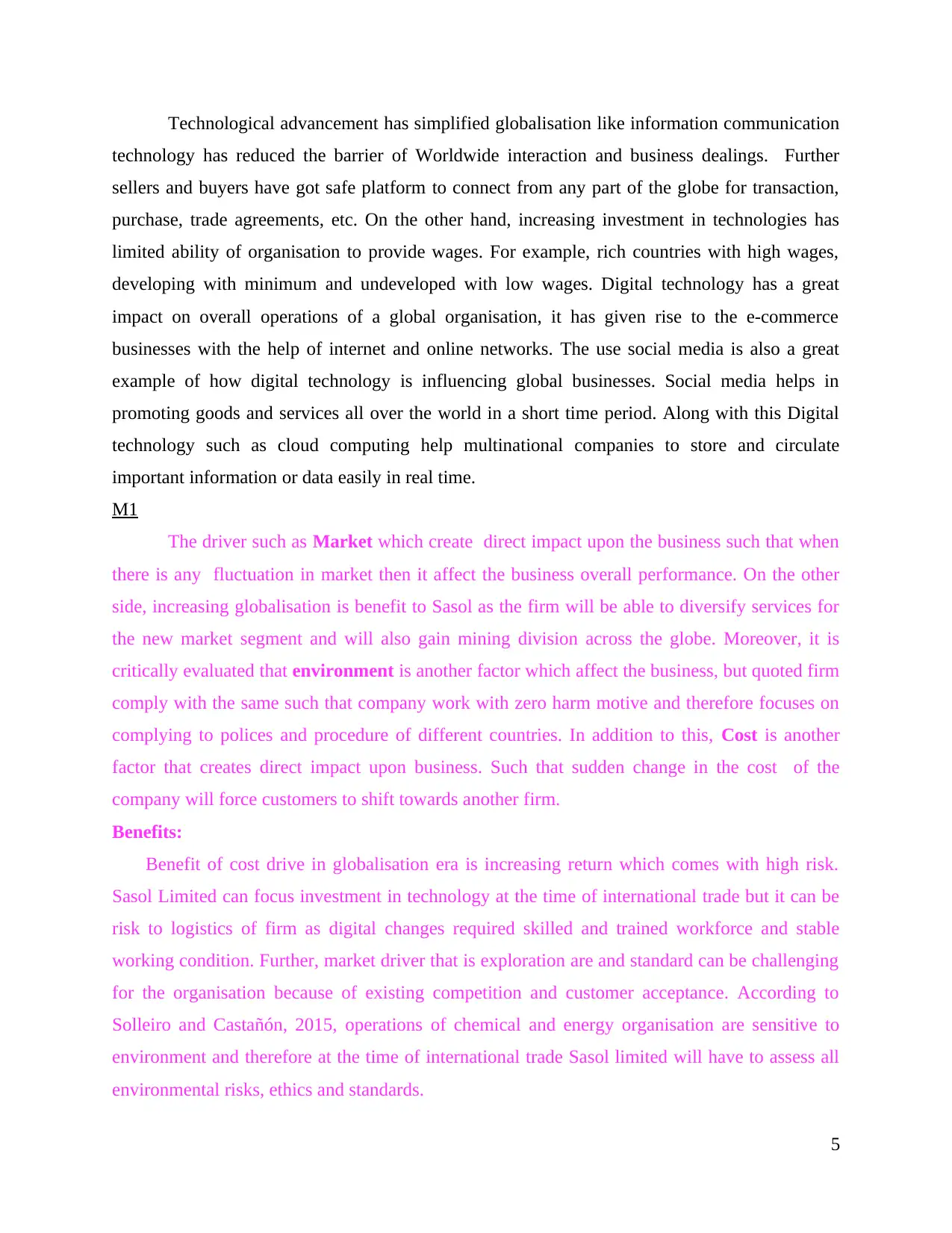
Technological advancement has simplified globalisation like information communication
technology has reduced the barrier of Worldwide interaction and business dealings. Further
sellers and buyers have got safe platform to connect from any part of the globe for transaction,
purchase, trade agreements, etc. On the other hand, increasing investment in technologies has
limited ability of organisation to provide wages. For example, rich countries with high wages,
developing with minimum and undeveloped with low wages. Digital technology has a great
impact on overall operations of a global organisation, it has given rise to the e-commerce
businesses with the help of internet and online networks. The use social media is also a great
example of how digital technology is influencing global businesses. Social media helps in
promoting goods and services all over the world in a short time period. Along with this Digital
technology such as cloud computing help multinational companies to store and circulate
important information or data easily in real time.
M1
The driver such as Market which create direct impact upon the business such that when
there is any fluctuation in market then it affect the business overall performance. On the other
side, increasing globalisation is benefit to Sasol as the firm will be able to diversify services for
the new market segment and will also gain mining division across the globe. Moreover, it is
critically evaluated that environment is another factor which affect the business, but quoted firm
comply with the same such that company work with zero harm motive and therefore focuses on
complying to polices and procedure of different countries. In addition to this, Cost is another
factor that creates direct impact upon business. Such that sudden change in the cost of the
company will force customers to shift towards another firm.
Benefits:
Benefit of cost drive in globalisation era is increasing return which comes with high risk.
Sasol Limited can focus investment in technology at the time of international trade but it can be
risk to logistics of firm as digital changes required skilled and trained workforce and stable
working condition. Further, market driver that is exploration are and standard can be challenging
for the organisation because of existing competition and customer acceptance. According to
Solleiro and Castañón, 2015, operations of chemical and energy organisation are sensitive to
environment and therefore at the time of international trade Sasol limited will have to assess all
environmental risks, ethics and standards.
5
technology has reduced the barrier of Worldwide interaction and business dealings. Further
sellers and buyers have got safe platform to connect from any part of the globe for transaction,
purchase, trade agreements, etc. On the other hand, increasing investment in technologies has
limited ability of organisation to provide wages. For example, rich countries with high wages,
developing with minimum and undeveloped with low wages. Digital technology has a great
impact on overall operations of a global organisation, it has given rise to the e-commerce
businesses with the help of internet and online networks. The use social media is also a great
example of how digital technology is influencing global businesses. Social media helps in
promoting goods and services all over the world in a short time period. Along with this Digital
technology such as cloud computing help multinational companies to store and circulate
important information or data easily in real time.
M1
The driver such as Market which create direct impact upon the business such that when
there is any fluctuation in market then it affect the business overall performance. On the other
side, increasing globalisation is benefit to Sasol as the firm will be able to diversify services for
the new market segment and will also gain mining division across the globe. Moreover, it is
critically evaluated that environment is another factor which affect the business, but quoted firm
comply with the same such that company work with zero harm motive and therefore focuses on
complying to polices and procedure of different countries. In addition to this, Cost is another
factor that creates direct impact upon business. Such that sudden change in the cost of the
company will force customers to shift towards another firm.
Benefits:
Benefit of cost drive in globalisation era is increasing return which comes with high risk.
Sasol Limited can focus investment in technology at the time of international trade but it can be
risk to logistics of firm as digital changes required skilled and trained workforce and stable
working condition. Further, market driver that is exploration are and standard can be challenging
for the organisation because of existing competition and customer acceptance. According to
Solleiro and Castañón, 2015, operations of chemical and energy organisation are sensitive to
environment and therefore at the time of international trade Sasol limited will have to assess all
environmental risks, ethics and standards.
5
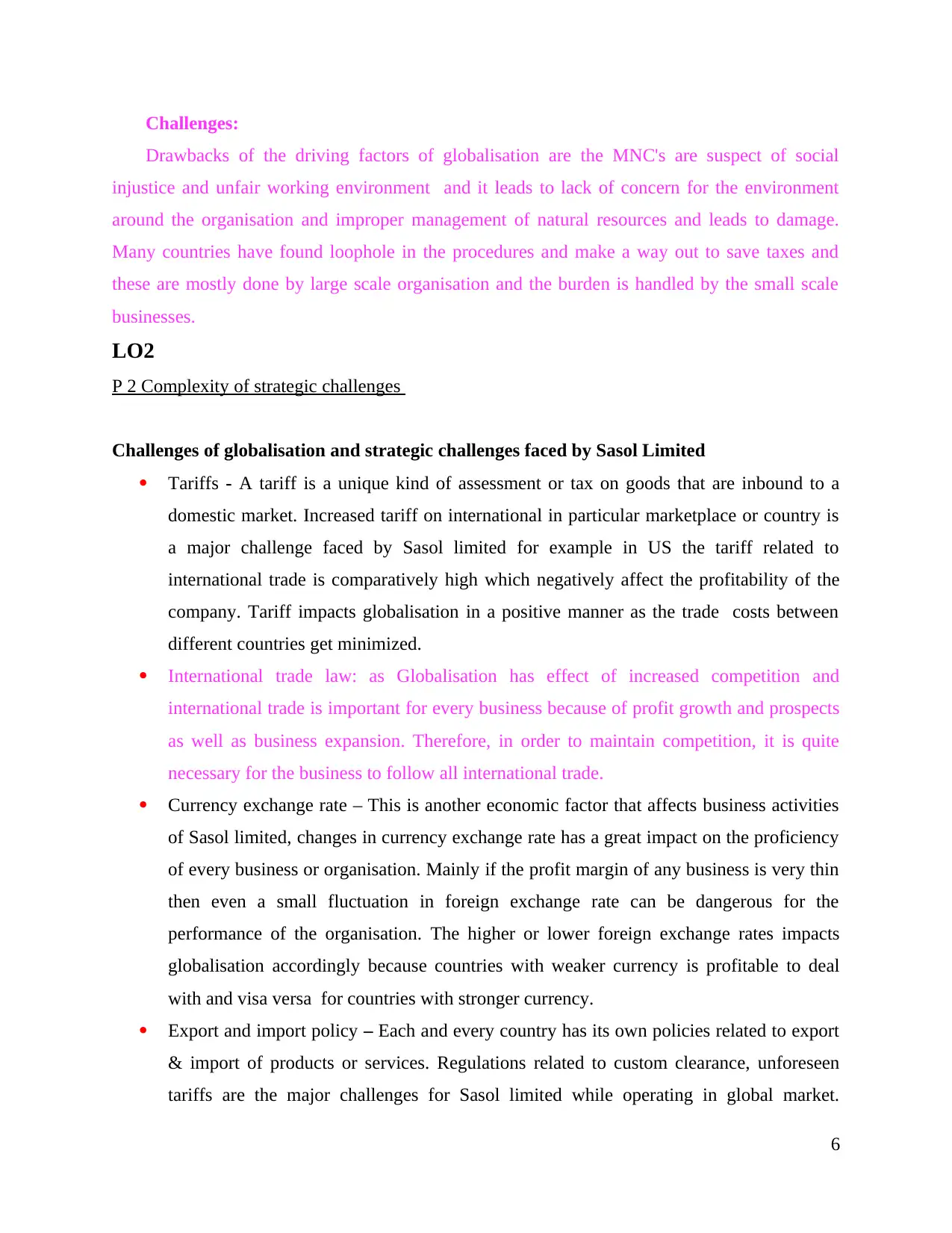
Challenges:
Drawbacks of the driving factors of globalisation are the MNC's are suspect of social
injustice and unfair working environment and it leads to lack of concern for the environment
around the organisation and improper management of natural resources and leads to damage.
Many countries have found loophole in the procedures and make a way out to save taxes and
these are mostly done by large scale organisation and the burden is handled by the small scale
businesses.
LO2
P 2 Complexity of strategic challenges
Challenges of globalisation and strategic challenges faced by Sasol Limited
Tariffs - A tariff is a unique kind of assessment or tax on goods that are inbound to a
domestic market. Increased tariff on international in particular marketplace or country is
a major challenge faced by Sasol limited for example in US the tariff related to
international trade is comparatively high which negatively affect the profitability of the
company. Tariff impacts globalisation in a positive manner as the trade costs between
different countries get minimized.
International trade law: as Globalisation has effect of increased competition and
international trade is important for every business because of profit growth and prospects
as well as business expansion. Therefore, in order to maintain competition, it is quite
necessary for the business to follow all international trade.
Currency exchange rate – This is another economic factor that affects business activities
of Sasol limited, changes in currency exchange rate has a great impact on the proficiency
of every business or organisation. Mainly if the profit margin of any business is very thin
then even a small fluctuation in foreign exchange rate can be dangerous for the
performance of the organisation. The higher or lower foreign exchange rates impacts
globalisation accordingly because countries with weaker currency is profitable to deal
with and visa versa for countries with stronger currency.
Export and import policy – Each and every country has its own policies related to export
& import of products or services. Regulations related to custom clearance, unforeseen
tariffs are the major challenges for Sasol limited while operating in global market.
6
Drawbacks of the driving factors of globalisation are the MNC's are suspect of social
injustice and unfair working environment and it leads to lack of concern for the environment
around the organisation and improper management of natural resources and leads to damage.
Many countries have found loophole in the procedures and make a way out to save taxes and
these are mostly done by large scale organisation and the burden is handled by the small scale
businesses.
LO2
P 2 Complexity of strategic challenges
Challenges of globalisation and strategic challenges faced by Sasol Limited
Tariffs - A tariff is a unique kind of assessment or tax on goods that are inbound to a
domestic market. Increased tariff on international in particular marketplace or country is
a major challenge faced by Sasol limited for example in US the tariff related to
international trade is comparatively high which negatively affect the profitability of the
company. Tariff impacts globalisation in a positive manner as the trade costs between
different countries get minimized.
International trade law: as Globalisation has effect of increased competition and
international trade is important for every business because of profit growth and prospects
as well as business expansion. Therefore, in order to maintain competition, it is quite
necessary for the business to follow all international trade.
Currency exchange rate – This is another economic factor that affects business activities
of Sasol limited, changes in currency exchange rate has a great impact on the proficiency
of every business or organisation. Mainly if the profit margin of any business is very thin
then even a small fluctuation in foreign exchange rate can be dangerous for the
performance of the organisation. The higher or lower foreign exchange rates impacts
globalisation accordingly because countries with weaker currency is profitable to deal
with and visa versa for countries with stronger currency.
Export and import policy – Each and every country has its own policies related to export
& import of products or services. Regulations related to custom clearance, unforeseen
tariffs are the major challenges for Sasol limited while operating in global market.
6
⊘ This is a preview!⊘
Do you want full access?
Subscribe today to unlock all pages.

Trusted by 1+ million students worldwide
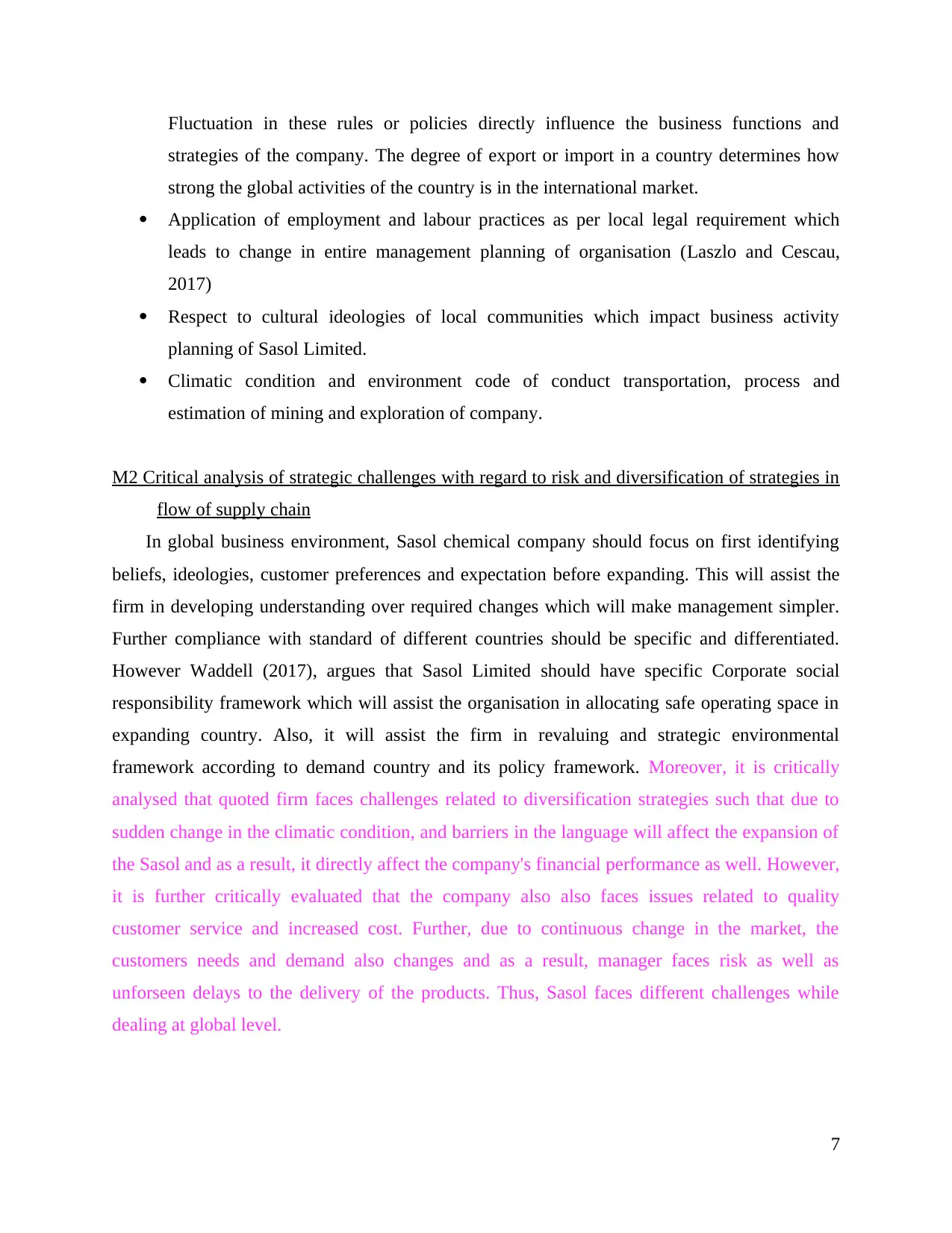
Fluctuation in these rules or policies directly influence the business functions and
strategies of the company. The degree of export or import in a country determines how
strong the global activities of the country is in the international market.
Application of employment and labour practices as per local legal requirement which
leads to change in entire management planning of organisation (Laszlo and Cescau,
2017)
Respect to cultural ideologies of local communities which impact business activity
planning of Sasol Limited.
Climatic condition and environment code of conduct transportation, process and
estimation of mining and exploration of company.
M2 Critical analysis of strategic challenges with regard to risk and diversification of strategies in
flow of supply chain
In global business environment, Sasol chemical company should focus on first identifying
beliefs, ideologies, customer preferences and expectation before expanding. This will assist the
firm in developing understanding over required changes which will make management simpler.
Further compliance with standard of different countries should be specific and differentiated.
However Waddell (2017), argues that Sasol Limited should have specific Corporate social
responsibility framework which will assist the organisation in allocating safe operating space in
expanding country. Also, it will assist the firm in revaluing and strategic environmental
framework according to demand country and its policy framework. Moreover, it is critically
analysed that quoted firm faces challenges related to diversification strategies such that due to
sudden change in the climatic condition, and barriers in the language will affect the expansion of
the Sasol and as a result, it directly affect the company's financial performance as well. However,
it is further critically evaluated that the company also also faces issues related to quality
customer service and increased cost. Further, due to continuous change in the market, the
customers needs and demand also changes and as a result, manager faces risk as well as
unforseen delays to the delivery of the products. Thus, Sasol faces different challenges while
dealing at global level.
7
strategies of the company. The degree of export or import in a country determines how
strong the global activities of the country is in the international market.
Application of employment and labour practices as per local legal requirement which
leads to change in entire management planning of organisation (Laszlo and Cescau,
2017)
Respect to cultural ideologies of local communities which impact business activity
planning of Sasol Limited.
Climatic condition and environment code of conduct transportation, process and
estimation of mining and exploration of company.
M2 Critical analysis of strategic challenges with regard to risk and diversification of strategies in
flow of supply chain
In global business environment, Sasol chemical company should focus on first identifying
beliefs, ideologies, customer preferences and expectation before expanding. This will assist the
firm in developing understanding over required changes which will make management simpler.
Further compliance with standard of different countries should be specific and differentiated.
However Waddell (2017), argues that Sasol Limited should have specific Corporate social
responsibility framework which will assist the organisation in allocating safe operating space in
expanding country. Also, it will assist the firm in revaluing and strategic environmental
framework according to demand country and its policy framework. Moreover, it is critically
analysed that quoted firm faces challenges related to diversification strategies such that due to
sudden change in the climatic condition, and barriers in the language will affect the expansion of
the Sasol and as a result, it directly affect the company's financial performance as well. However,
it is further critically evaluated that the company also also faces issues related to quality
customer service and increased cost. Further, due to continuous change in the market, the
customers needs and demand also changes and as a result, manager faces risk as well as
unforseen delays to the delivery of the products. Thus, Sasol faces different challenges while
dealing at global level.
7
Paraphrase This Document
Need a fresh take? Get an instant paraphrase of this document with our AI Paraphraser
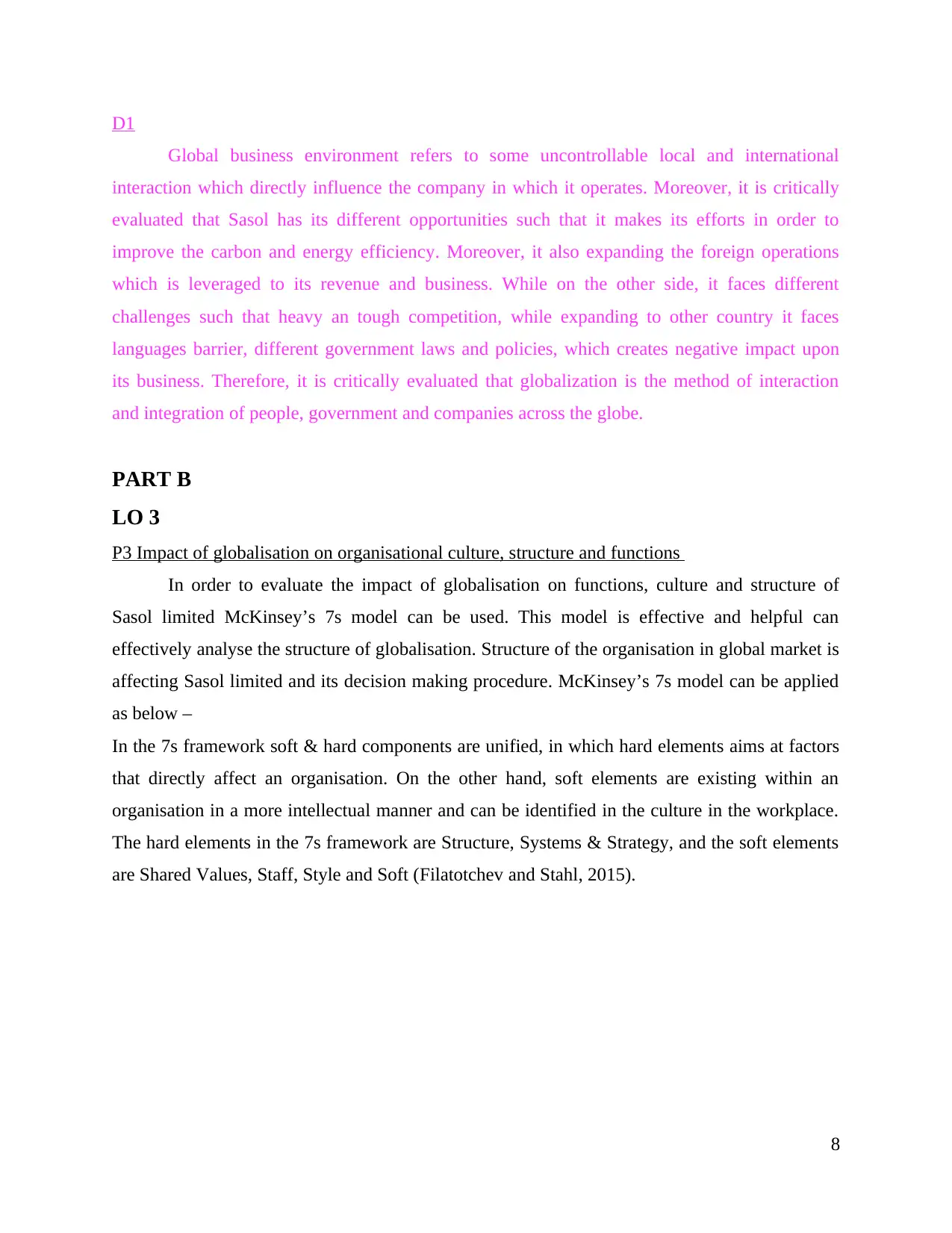
D1
Global business environment refers to some uncontrollable local and international
interaction which directly influence the company in which it operates. Moreover, it is critically
evaluated that Sasol has its different opportunities such that it makes its efforts in order to
improve the carbon and energy efficiency. Moreover, it also expanding the foreign operations
which is leveraged to its revenue and business. While on the other side, it faces different
challenges such that heavy an tough competition, while expanding to other country it faces
languages barrier, different government laws and policies, which creates negative impact upon
its business. Therefore, it is critically evaluated that globalization is the method of interaction
and integration of people, government and companies across the globe.
PART B
LO 3
P3 Impact of globalisation on organisational culture, structure and functions
In order to evaluate the impact of globalisation on functions, culture and structure of
Sasol limited McKinsey’s 7s model can be used. This model is effective and helpful can
effectively analyse the structure of globalisation. Structure of the organisation in global market is
affecting Sasol limited and its decision making procedure. McKinsey’s 7s model can be applied
as below –
In the 7s framework soft & hard components are unified, in which hard elements aims at factors
that directly affect an organisation. On the other hand, soft elements are existing within an
organisation in a more intellectual manner and can be identified in the culture in the workplace.
The hard elements in the 7s framework are Structure, Systems & Strategy, and the soft elements
are Shared Values, Staff, Style and Soft (Filatotchev and Stahl, 2015).
8
Global business environment refers to some uncontrollable local and international
interaction which directly influence the company in which it operates. Moreover, it is critically
evaluated that Sasol has its different opportunities such that it makes its efforts in order to
improve the carbon and energy efficiency. Moreover, it also expanding the foreign operations
which is leveraged to its revenue and business. While on the other side, it faces different
challenges such that heavy an tough competition, while expanding to other country it faces
languages barrier, different government laws and policies, which creates negative impact upon
its business. Therefore, it is critically evaluated that globalization is the method of interaction
and integration of people, government and companies across the globe.
PART B
LO 3
P3 Impact of globalisation on organisational culture, structure and functions
In order to evaluate the impact of globalisation on functions, culture and structure of
Sasol limited McKinsey’s 7s model can be used. This model is effective and helpful can
effectively analyse the structure of globalisation. Structure of the organisation in global market is
affecting Sasol limited and its decision making procedure. McKinsey’s 7s model can be applied
as below –
In the 7s framework soft & hard components are unified, in which hard elements aims at factors
that directly affect an organisation. On the other hand, soft elements are existing within an
organisation in a more intellectual manner and can be identified in the culture in the workplace.
The hard elements in the 7s framework are Structure, Systems & Strategy, and the soft elements
are Shared Values, Staff, Style and Soft (Filatotchev and Stahl, 2015).
8
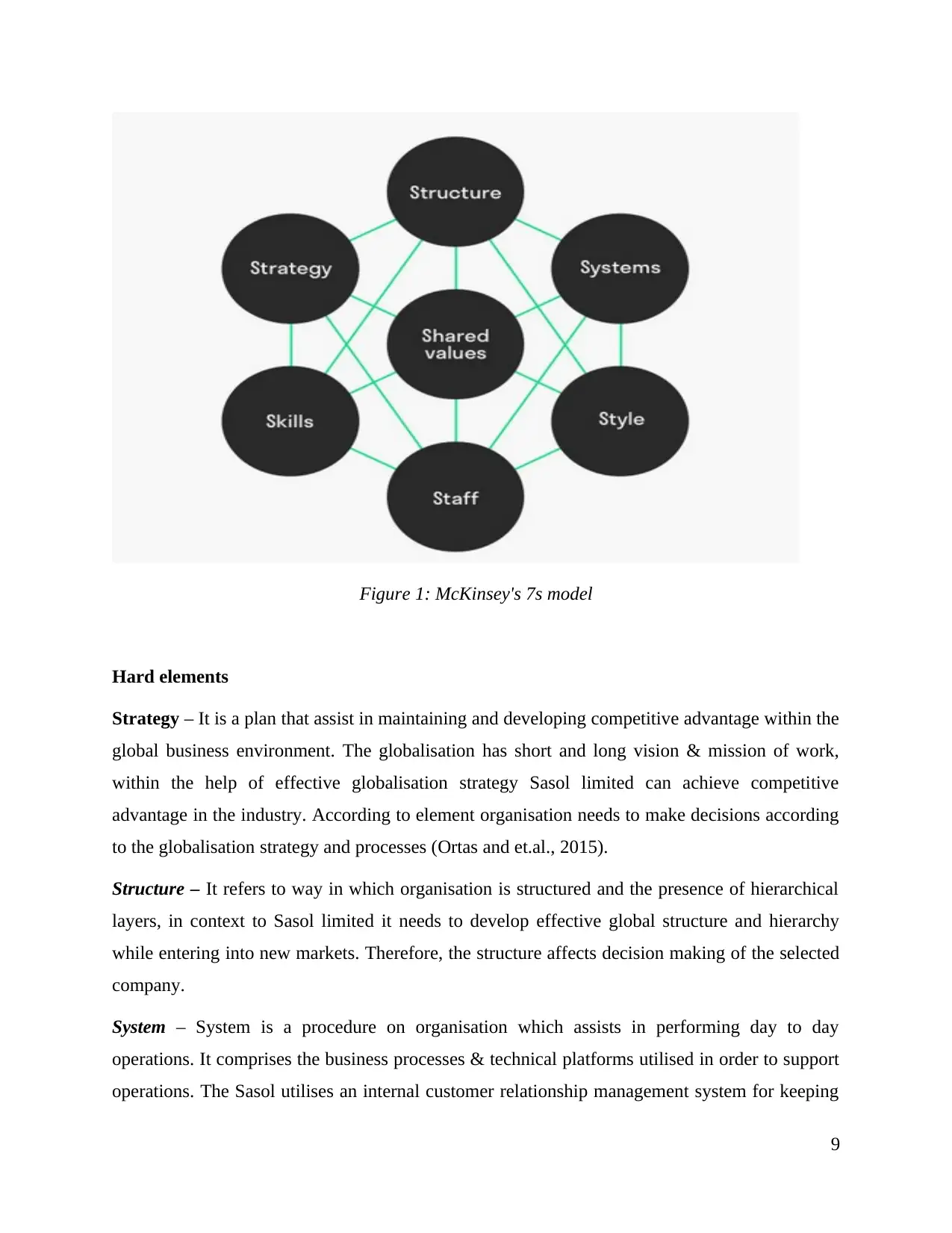
Figure 1: McKinsey's 7s model
Hard elements
Strategy – It is a plan that assist in maintaining and developing competitive advantage within the
global business environment. The globalisation has short and long vision & mission of work,
within the help of effective globalisation strategy Sasol limited can achieve competitive
advantage in the industry. According to element organisation needs to make decisions according
to the globalisation strategy and processes (Ortas and et.al., 2015).
Structure – It refers to way in which organisation is structured and the presence of hierarchical
layers, in context to Sasol limited it needs to develop effective global structure and hierarchy
while entering into new markets. Therefore, the structure affects decision making of the selected
company.
System – System is a procedure on organisation which assists in performing day to day
operations. It comprises the business processes & technical platforms utilised in order to support
operations. The Sasol utilises an internal customer relationship management system for keeping
9
Hard elements
Strategy – It is a plan that assist in maintaining and developing competitive advantage within the
global business environment. The globalisation has short and long vision & mission of work,
within the help of effective globalisation strategy Sasol limited can achieve competitive
advantage in the industry. According to element organisation needs to make decisions according
to the globalisation strategy and processes (Ortas and et.al., 2015).
Structure – It refers to way in which organisation is structured and the presence of hierarchical
layers, in context to Sasol limited it needs to develop effective global structure and hierarchy
while entering into new markets. Therefore, the structure affects decision making of the selected
company.
System – System is a procedure on organisation which assists in performing day to day
operations. It comprises the business processes & technical platforms utilised in order to support
operations. The Sasol utilises an internal customer relationship management system for keeping
9
⊘ This is a preview!⊘
Do you want full access?
Subscribe today to unlock all pages.

Trusted by 1+ million students worldwide
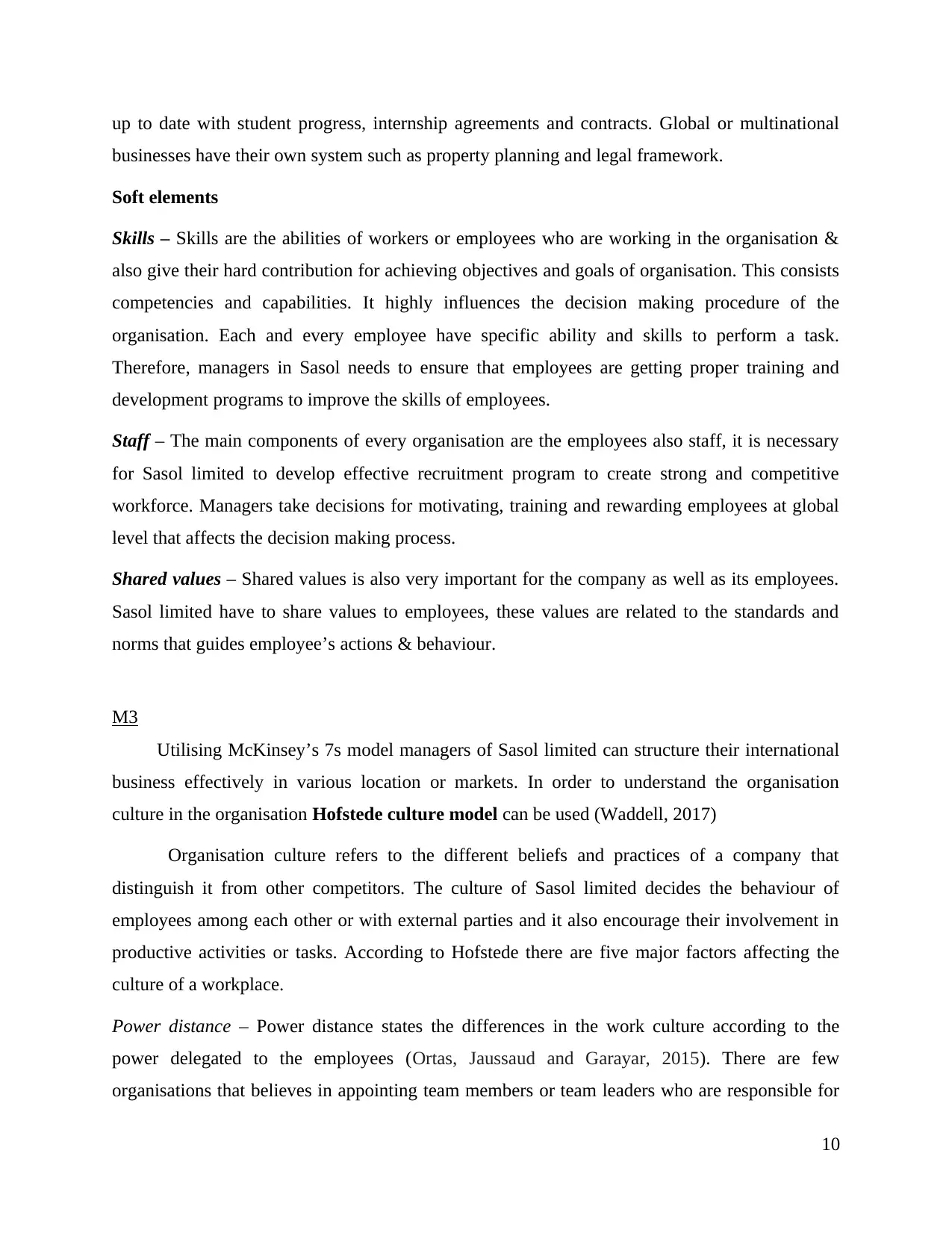
up to date with student progress, internship agreements and contracts. Global or multinational
businesses have their own system such as property planning and legal framework.
Soft elements
Skills – Skills are the abilities of workers or employees who are working in the organisation &
also give their hard contribution for achieving objectives and goals of organisation. This consists
competencies and capabilities. It highly influences the decision making procedure of the
organisation. Each and every employee have specific ability and skills to perform a task.
Therefore, managers in Sasol needs to ensure that employees are getting proper training and
development programs to improve the skills of employees.
Staff – The main components of every organisation are the employees also staff, it is necessary
for Sasol limited to develop effective recruitment program to create strong and competitive
workforce. Managers take decisions for motivating, training and rewarding employees at global
level that affects the decision making process.
Shared values – Shared values is also very important for the company as well as its employees.
Sasol limited have to share values to employees, these values are related to the standards and
norms that guides employee’s actions & behaviour.
M3
Utilising McKinsey’s 7s model managers of Sasol limited can structure their international
business effectively in various location or markets. In order to understand the organisation
culture in the organisation Hofstede culture model can be used (Waddell, 2017)
Organisation culture refers to the different beliefs and practices of a company that
distinguish it from other competitors. The culture of Sasol limited decides the behaviour of
employees among each other or with external parties and it also encourage their involvement in
productive activities or tasks. According to Hofstede there are five major factors affecting the
culture of a workplace.
Power distance – Power distance states the differences in the work culture according to the
power delegated to the employees (Ortas, Jaussaud and Garayar, 2015). There are few
organisations that believes in appointing team members or team leaders who are responsible for
10
businesses have their own system such as property planning and legal framework.
Soft elements
Skills – Skills are the abilities of workers or employees who are working in the organisation &
also give their hard contribution for achieving objectives and goals of organisation. This consists
competencies and capabilities. It highly influences the decision making procedure of the
organisation. Each and every employee have specific ability and skills to perform a task.
Therefore, managers in Sasol needs to ensure that employees are getting proper training and
development programs to improve the skills of employees.
Staff – The main components of every organisation are the employees also staff, it is necessary
for Sasol limited to develop effective recruitment program to create strong and competitive
workforce. Managers take decisions for motivating, training and rewarding employees at global
level that affects the decision making process.
Shared values – Shared values is also very important for the company as well as its employees.
Sasol limited have to share values to employees, these values are related to the standards and
norms that guides employee’s actions & behaviour.
M3
Utilising McKinsey’s 7s model managers of Sasol limited can structure their international
business effectively in various location or markets. In order to understand the organisation
culture in the organisation Hofstede culture model can be used (Waddell, 2017)
Organisation culture refers to the different beliefs and practices of a company that
distinguish it from other competitors. The culture of Sasol limited decides the behaviour of
employees among each other or with external parties and it also encourage their involvement in
productive activities or tasks. According to Hofstede there are five major factors affecting the
culture of a workplace.
Power distance – Power distance states the differences in the work culture according to the
power delegated to the employees (Ortas, Jaussaud and Garayar, 2015). There are few
organisations that believes in appointing team members or team leaders who are responsible for
10
Paraphrase This Document
Need a fresh take? Get an instant paraphrase of this document with our AI Paraphraser
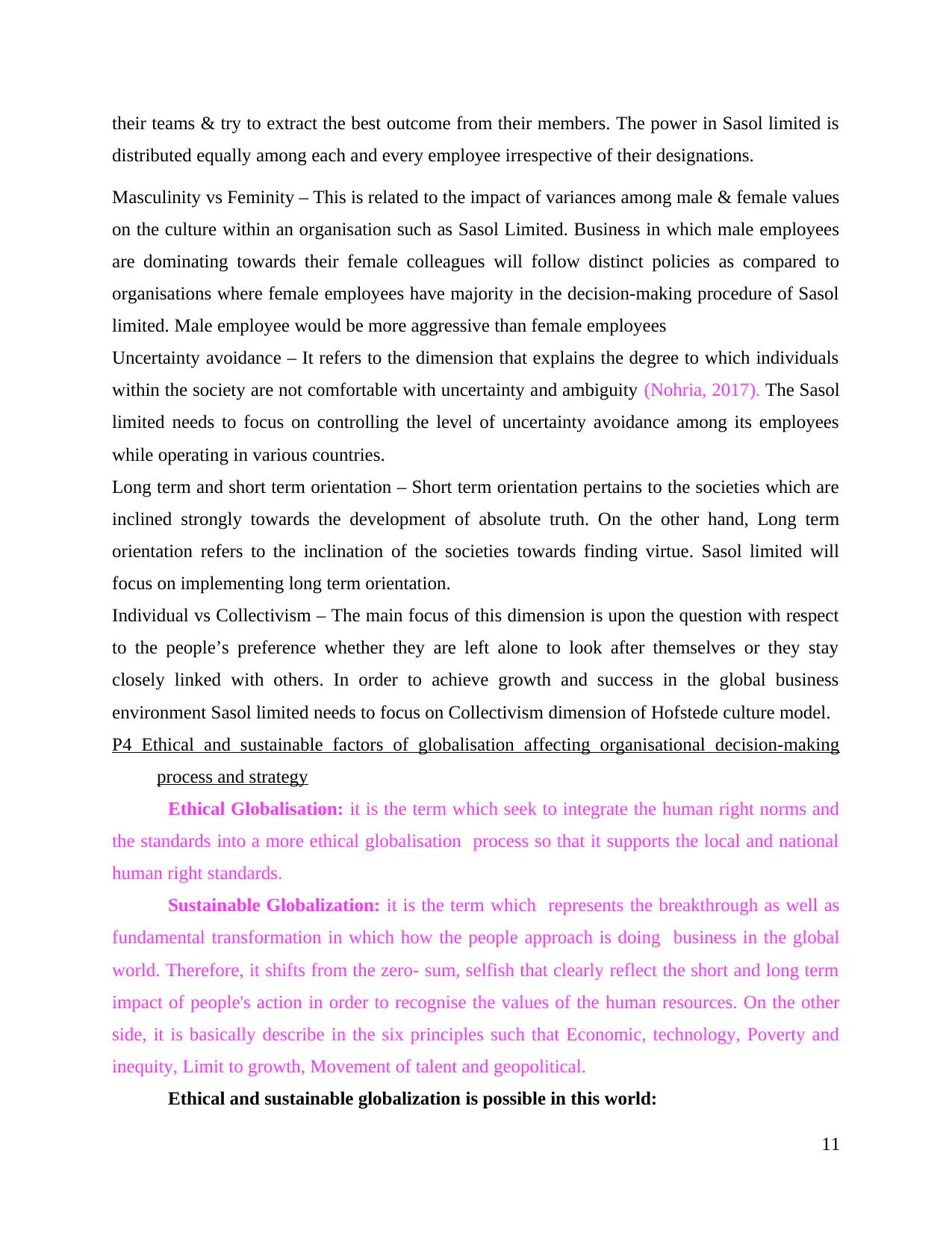
their teams & try to extract the best outcome from their members. The power in Sasol limited is
distributed equally among each and every employee irrespective of their designations.
Masculinity vs Feminity – This is related to the impact of variances among male & female values
on the culture within an organisation such as Sasol Limited. Business in which male employees
are dominating towards their female colleagues will follow distinct policies as compared to
organisations where female employees have majority in the decision-making procedure of Sasol
limited. Male employee would be more aggressive than female employees
Uncertainty avoidance – It refers to the dimension that explains the degree to which individuals
within the society are not comfortable with uncertainty and ambiguity (Nohria, 2017). The Sasol
limited needs to focus on controlling the level of uncertainty avoidance among its employees
while operating in various countries.
Long term and short term orientation – Short term orientation pertains to the societies which are
inclined strongly towards the development of absolute truth. On the other hand, Long term
orientation refers to the inclination of the societies towards finding virtue. Sasol limited will
focus on implementing long term orientation.
Individual vs Collectivism – The main focus of this dimension is upon the question with respect
to the people’s preference whether they are left alone to look after themselves or they stay
closely linked with others. In order to achieve growth and success in the global business
environment Sasol limited needs to focus on Collectivism dimension of Hofstede culture model.
P4 Ethical and sustainable factors of globalisation affecting organisational decision-making
process and strategy
Ethical Globalisation: it is the term which seek to integrate the human right norms and
the standards into a more ethical globalisation process so that it supports the local and national
human right standards.
Sustainable Globalization: it is the term which represents the breakthrough as well as
fundamental transformation in which how the people approach is doing business in the global
world. Therefore, it shifts from the zero- sum, selfish that clearly reflect the short and long term
impact of people's action in order to recognise the values of the human resources. On the other
side, it is basically describe in the six principles such that Economic, technology, Poverty and
inequity, Limit to growth, Movement of talent and geopolitical.
Ethical and sustainable globalization is possible in this world:
11
distributed equally among each and every employee irrespective of their designations.
Masculinity vs Feminity – This is related to the impact of variances among male & female values
on the culture within an organisation such as Sasol Limited. Business in which male employees
are dominating towards their female colleagues will follow distinct policies as compared to
organisations where female employees have majority in the decision-making procedure of Sasol
limited. Male employee would be more aggressive than female employees
Uncertainty avoidance – It refers to the dimension that explains the degree to which individuals
within the society are not comfortable with uncertainty and ambiguity (Nohria, 2017). The Sasol
limited needs to focus on controlling the level of uncertainty avoidance among its employees
while operating in various countries.
Long term and short term orientation – Short term orientation pertains to the societies which are
inclined strongly towards the development of absolute truth. On the other hand, Long term
orientation refers to the inclination of the societies towards finding virtue. Sasol limited will
focus on implementing long term orientation.
Individual vs Collectivism – The main focus of this dimension is upon the question with respect
to the people’s preference whether they are left alone to look after themselves or they stay
closely linked with others. In order to achieve growth and success in the global business
environment Sasol limited needs to focus on Collectivism dimension of Hofstede culture model.
P4 Ethical and sustainable factors of globalisation affecting organisational decision-making
process and strategy
Ethical Globalisation: it is the term which seek to integrate the human right norms and
the standards into a more ethical globalisation process so that it supports the local and national
human right standards.
Sustainable Globalization: it is the term which represents the breakthrough as well as
fundamental transformation in which how the people approach is doing business in the global
world. Therefore, it shifts from the zero- sum, selfish that clearly reflect the short and long term
impact of people's action in order to recognise the values of the human resources. On the other
side, it is basically describe in the six principles such that Economic, technology, Poverty and
inequity, Limit to growth, Movement of talent and geopolitical.
Ethical and sustainable globalization is possible in this world:
11
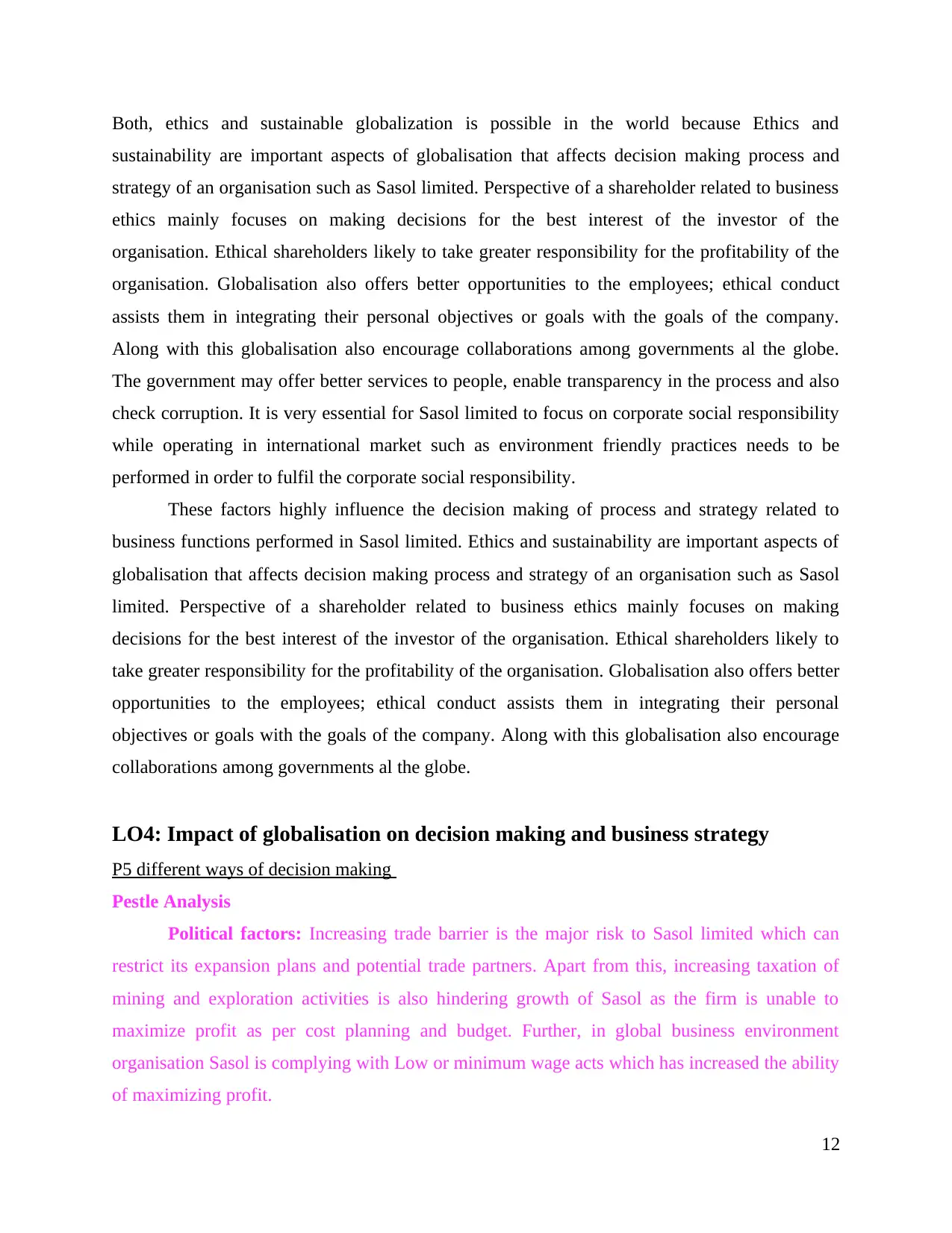
Both, ethics and sustainable globalization is possible in the world because Ethics and
sustainability are important aspects of globalisation that affects decision making process and
strategy of an organisation such as Sasol limited. Perspective of a shareholder related to business
ethics mainly focuses on making decisions for the best interest of the investor of the
organisation. Ethical shareholders likely to take greater responsibility for the profitability of the
organisation. Globalisation also offers better opportunities to the employees; ethical conduct
assists them in integrating their personal objectives or goals with the goals of the company.
Along with this globalisation also encourage collaborations among governments al the globe.
The government may offer better services to people, enable transparency in the process and also
check corruption. It is very essential for Sasol limited to focus on corporate social responsibility
while operating in international market such as environment friendly practices needs to be
performed in order to fulfil the corporate social responsibility.
These factors highly influence the decision making of process and strategy related to
business functions performed in Sasol limited. Ethics and sustainability are important aspects of
globalisation that affects decision making process and strategy of an organisation such as Sasol
limited. Perspective of a shareholder related to business ethics mainly focuses on making
decisions for the best interest of the investor of the organisation. Ethical shareholders likely to
take greater responsibility for the profitability of the organisation. Globalisation also offers better
opportunities to the employees; ethical conduct assists them in integrating their personal
objectives or goals with the goals of the company. Along with this globalisation also encourage
collaborations among governments al the globe.
LO4: Impact of globalisation on decision making and business strategy
P5 different ways of decision making
Pestle Analysis
Political factors: Increasing trade barrier is the major risk to Sasol limited which can
restrict its expansion plans and potential trade partners. Apart from this, increasing taxation of
mining and exploration activities is also hindering growth of Sasol as the firm is unable to
maximize profit as per cost planning and budget. Further, in global business environment
organisation Sasol is complying with Low or minimum wage acts which has increased the ability
of maximizing profit.
12
sustainability are important aspects of globalisation that affects decision making process and
strategy of an organisation such as Sasol limited. Perspective of a shareholder related to business
ethics mainly focuses on making decisions for the best interest of the investor of the
organisation. Ethical shareholders likely to take greater responsibility for the profitability of the
organisation. Globalisation also offers better opportunities to the employees; ethical conduct
assists them in integrating their personal objectives or goals with the goals of the company.
Along with this globalisation also encourage collaborations among governments al the globe.
The government may offer better services to people, enable transparency in the process and also
check corruption. It is very essential for Sasol limited to focus on corporate social responsibility
while operating in international market such as environment friendly practices needs to be
performed in order to fulfil the corporate social responsibility.
These factors highly influence the decision making of process and strategy related to
business functions performed in Sasol limited. Ethics and sustainability are important aspects of
globalisation that affects decision making process and strategy of an organisation such as Sasol
limited. Perspective of a shareholder related to business ethics mainly focuses on making
decisions for the best interest of the investor of the organisation. Ethical shareholders likely to
take greater responsibility for the profitability of the organisation. Globalisation also offers better
opportunities to the employees; ethical conduct assists them in integrating their personal
objectives or goals with the goals of the company. Along with this globalisation also encourage
collaborations among governments al the globe.
LO4: Impact of globalisation on decision making and business strategy
P5 different ways of decision making
Pestle Analysis
Political factors: Increasing trade barrier is the major risk to Sasol limited which can
restrict its expansion plans and potential trade partners. Apart from this, increasing taxation of
mining and exploration activities is also hindering growth of Sasol as the firm is unable to
maximize profit as per cost planning and budget. Further, in global business environment
organisation Sasol is complying with Low or minimum wage acts which has increased the ability
of maximizing profit.
12
⊘ This is a preview!⊘
Do you want full access?
Subscribe today to unlock all pages.

Trusted by 1+ million students worldwide
1 out of 18
Related Documents
Your All-in-One AI-Powered Toolkit for Academic Success.
+13062052269
info@desklib.com
Available 24*7 on WhatsApp / Email
![[object Object]](/_next/static/media/star-bottom.7253800d.svg)
Unlock your academic potential
Copyright © 2020–2026 A2Z Services. All Rights Reserved. Developed and managed by ZUCOL.



